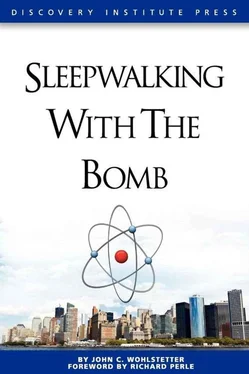John Wohlstetter - Sleepwalking with the Bomb
Здесь есть возможность читать онлайн «John Wohlstetter - Sleepwalking with the Bomb» весь текст электронной книги совершенно бесплатно (целиком полную версию без сокращений). В некоторых случаях можно слушать аудио, скачать через торрент в формате fb2 и присутствует краткое содержание. Город: Seattle, Год выпуска: 2012, ISBN: 2012, Издательство: Discovery Institute Press, Жанр: История, military, Политика, Публицистика, на английском языке. Описание произведения, (предисловие) а так же отзывы посетителей доступны на портале библиотеки ЛибКат.
- Название:Sleepwalking with the Bomb
- Автор:
- Издательство:Discovery Institute Press
- Жанр:
- Год:2012
- Город:Seattle
- ISBN:978-1-93659-906-6
- Рейтинг книги:3 / 5. Голосов: 1
-
Избранное:Добавить в избранное
- Отзывы:
-
Ваша оценка:
- 60
- 1
- 2
- 3
- 4
- 5
Sleepwalking with the Bomb: краткое содержание, описание и аннотация
Предлагаем к чтению аннотацию, описание, краткое содержание или предисловие (зависит от того, что написал сам автор книги «Sleepwalking with the Bomb»). Если вы не нашли необходимую информацию о книге — напишите в комментариях, мы постараемся отыскать её.
RICHARD PERLE, Resident Fellow, American Enterprise Institute and Assistant Secretary of Defense, 1981–1987 Sleepwalking with the Bomb
Sleepwalking with the Bomb — читать онлайн бесплатно полную книгу (весь текст) целиком
Ниже представлен текст книги, разбитый по страницам. Система сохранения места последней прочитанной страницы, позволяет с удобством читать онлайн бесплатно книгу «Sleepwalking with the Bomb», без необходимости каждый раз заново искать на чём Вы остановились. Поставьте закладку, и сможете в любой момент перейти на страницу, на которой закончили чтение.
Интервал:
Закладка:
With a population of over 10 million people, Seoul is one of the largest cities in the world, and at 17,000 people per square mile, it is also one of the densest. It has double the population density of Mexico City, more than triple that of Tokyo-Yokohama or London, and more than eight times that of New York. The city and its outskirts hold over half the population of the Republic of Korea, better known as South Korea.
All these people and brightly lit skyscrapers are clustered together a mere 25 miles south of the 38th parallel dividing the two Koreas. Across the demilitarized zone, one of the largest armies in the world faces Seoul. A hundred miles further north lies Pyongyang, a capital city of gigantic monuments (including an extra-large version of Paris’s Arc de Triomphe) and massive, low-slung buildings. The North’s capital is a thousand square miles bigger than Seoul, but has less than one-third its population. Former Secretary of Defense Donald Rumsfeld liked to display a satellite photo taken at night of the Korean Peninsula that showed a brilliantly lit South Korea versus a nearly totally dark North. In the nineteenth century, Westerners called Korea the “Hermit Kingdom”; now the name fits only its northern half.
Were Seoul even 50 more miles from the 38th parallel, the strategic situation would be quite different. But at half that distance, it lies well inside the range of Pyongyang’s artillery. The North, effectively insulated from attack since it became a nuclear power in 2006, is, metaphorically, the cornered criminal holding a gun to the head of a hostage and shouting “One false move.”
Russia created, and then China protected, a monster rump state that has held peninsular peace hostage since 1948. Joseph Stalin’s Asian satellite state gave the United States its first stalemate in a major conflict, and established practical limits to nuclear use by a superpower with Western values.
Stalin had a definite strategic plan when, with one week to go in the Pacific War, his troops invaded Manchuria. Put simply, he wanted to seize territory from a collapsing empire before borders were set at war’s end. Stalin knew about the power of the atom bomb even before President Truman told him of it in late July at the Potsdam Conference. He prepared his troops to invade Manchuria, the area northeast of China from whence came the last dynastic rulers of China, the Manchu. On August 8, 1945, two days after the Hiroshima bomb exploded and one day before the Nagasaki bomb, Soviet troops poured into Manchuria.
Stalin’s army overwhelmed the Japanese garrisons in Manchuria and continued fighting southwards despite Japan’s informal surrender on August 14. By September 2, when the Japanese foreign minister signed his country’s unconditional surrender on the deck of the battleship USS Missouri, ending World War II, Stalin had taken the northern half of the Korean Peninsula.
He created in North Korea a tyranny in his own image, risibly named the Democratic People’s Republic of Korea, though neither governed by leaders elected by its people nor in any sense of the term a republic. His last-minute land grab gave Stalin a seat at the Asian part of the diplomatic table, one utterly undeserved.
North Korea persisted in its nuclear program for more than a quarter century, even as 1 or 2 million of its people literally starved to death within a society virtually devoid of normal commercial activity. With its ongoing nuclear program—and even while adding uranium enrichment to plutonium extraction as a method of nuclear weapon fuel production—Pyongyang has serially blackmailed the West for assistance. It has been able to do this for two reasons. First, there is the “dying sting” threat. Once a rogue state goes nuclear, any attempt to disarm it risks failing to find and destroy (or otherwise gain control over) all its weapons. A nuclear state like North Korea, if facing imminent extinction, might decide to fire its nuclear weapons and inflict maximum damage before it falls. Second, 11,000 North Korean artillery pieces are pointed at Seoul, the South’s capital. Those pieces can lay an estimated minimum of 300,000 shells per hour on the Seoul metropolitan area. In 1994 the Pentagon assessed the risks of a military strike on the North’s plutonium reactor, but stood down because artillery could well inflict 100,000 casualties on Seoul’s populace.
Thus the options for America and its Asia-Pacific allies in the confrontation with Pyongyang are severely limited. The United States, in particular, has to take care not to undercut its alliance partners by dealing directly with the North—or with the North and China. Given North Korea’s consistent violation of every commitment it has ever made, there is no credible reason to believe that any further negotiations will bear fruit. The true significance of diplomatic talks is symbolic. Western countries that break off talks risk alienating portions of their publics. Rogue states cheerfully will use international media outlets to blame the West for rising tensions and gain traction with the idealistic and credulous.
The failure to stop North Korea risks encouraging nuclear proliferation by America’s increasingly nervous allies. South Korea, Taiwan, Japan, and Australia each could go nuclear in less than a year, having stocks of nuclear fuel and all the technical expertise needed to rapidly weaponize.
Yesterday’s Korea: The Hermit Gets a Bomb
AT THE beginning of 1950, the normally astute and far-sighted Dean Acheson, the U.S. secretary of state, made a speech in which he excluded South Korea from the reach of America’s vital geostrategic interests—issuing, albeit unintentionally, an invitation for conquest. Stalin, the wrong person to whom to send such an invitation, accepted the offer. He gave his puppet, Kim Il-Sung—a former Red Army sniper who would fill his starving country with 34,000 monuments to himself—his express consent to start a war. Another interpretation of events is offered by Henry Kissinger. Because he found no Russian reference to Acheson’s speech as the reason Stalin consented to the war option, Kissinger concludes that the culprit was National Security Council memorandum 48/2, [21] Established in 1947, the National Security Council is an advisory body that is part of the White House staff. The NSC advises the president and coordinates foreign and defense policy matters within the White House.
adopted December 30, 1949. It excluded Taiwan and South Korea from the sphere of vital American security interests in Asia—those over which America would go to war. Soviet-era files showed references to this document in assessing whether to invade the South.
Less than six months after America’s all-but-engraved invitation, on June 25, 1950, Kim Il-Sung’s Soviet-equipped troops crossed the 38th parallel and invaded South Korea. The attack caught the United States flat-footed.
Acheson alerted President Truman, at home in Missouri, and the UN Secretary-General, Trygvye Lie, who immediately convened the Security Council. Charged at the end of World War II with the ambitious goal of maintaining international peace, the Security Council faced a major test. Of its five permanent members with the power of veto—the United States, the United Kingdom, France, Nationalist China, and the USSR—one had encouraged North Korea’s aggression and would likely veto any effort to help South Korea. Meanwhile, Chiang Kai-Shek’s Nationalist China, the loser of China’s quarter century of intermittent civil war, had retreated to the island of Taiwan the year before. This left the mainland—and the Korean border—to Mao Zedong’s Chinese Communist Party.
Less than 24 hours after the North Korean attack, the Security Council met in New York City to discuss the crisis. In a diplomatic blunder they did not repeat until 2011 (as to intervention in Libya), the Russians boycotted the meeting and lost their chance to veto. President Truman assembled a 16-nation coalition under the auspices of the United Nations, and American soldiers soon were fighting what became officially known as a “police action” under the UN aegis.
Читать дальшеИнтервал:
Закладка:
Похожие книги на «Sleepwalking with the Bomb»
Представляем Вашему вниманию похожие книги на «Sleepwalking with the Bomb» списком для выбора. Мы отобрали схожую по названию и смыслу литературу в надежде предоставить читателям больше вариантов отыскать новые, интересные, ещё непрочитанные произведения.
Обсуждение, отзывы о книге «Sleepwalking with the Bomb» и просто собственные мнения читателей. Оставьте ваши комментарии, напишите, что Вы думаете о произведении, его смысле или главных героях. Укажите что конкретно понравилось, а что нет, и почему Вы так считаете.












